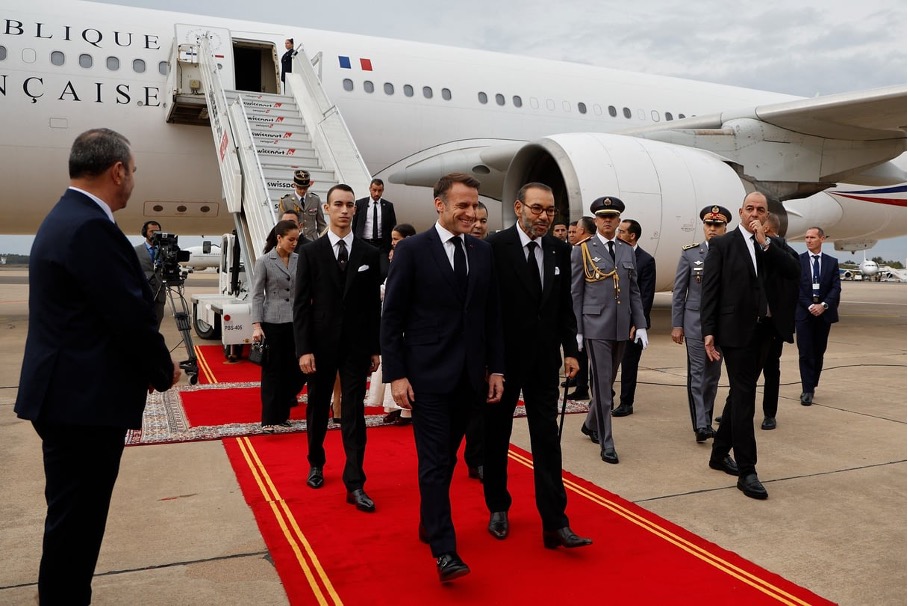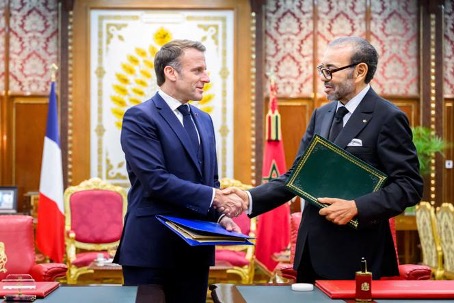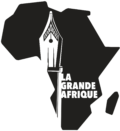
Moroccan King Mohammed VI accompanies French President Emmanuel Macron on his arrival in the capital Rabat on October 28, 2024. Ludovic MARIN / POOL / AFP
The thaw between Paris and Rabat has been announced. Emmanuel Macron’s state visit to Morocco from October 28 to 30 has raised hopes of renewed relations between the two shores of the Mediterranean. After three years marked by tensions and misunderstandings, this event represents a welcome rapprochement between Paris and Rabat. Welcomed by His Majesty King Mohammed VI in an atmosphere marked by solemnity, the French President was received with eagerness that testifies to the special attachment that Morocco has for its historic partner.
A strong symbol of reconciliation, this well-organized trip marks a real diplomatic warming between the two countries and a shared desire to turn the page after three years of falling out. In July 2024, a decisive turning point had already been reached when France officially supported Morocco’s autonomy plan for the Sahara, joining the position of influential allies such as the United States and Spain.
Paris-Rabat: From Tense Diplomacy to Renewed Partnership
Over the past three years, relations between Paris and Rabat have gone through a turbulent period. Although the Élysée Palace has carefully avoided any talk of a “diplomatic crisis,” ties between the two countries have clearly cooled. In autumn 2021, France announced a drastic reduction in the number of visas granted to Moroccan nationals, halving the volume of applications accepted. This measure was intended to exert pressure on Maghreb countries, accused of slowing down the return of their nationals in irregular situations. At the same time, France’s policy of rapprochement with Algeria has heightened tensions with Morocco, against a backdrop of broken relations between Algiers and Rabat since 2021. Added to this is the Pegasus Affair, revealed in 2021 by the Forbidden Stories media consortium. The phones of French President Emmanuel Macron and some of his ministers were allegedly targeted in 2019 by Israeli spyware Pegasus, with Morocco named as one of the implicated governments. In response to these accusations, Morocco firmly denied and denounced an “attempt at destabilization,” as Chakib Benmoussa, Moroccan ambassador to France at the time, put it. It is in this climate of mistrust that Emmanuel Macron’s state visit seeks to restore confidence and pave the way for a renewal of relations between the two countries: the end of the cycle of disenchantment is in sight.
Moroccan Sovereignty: A Unifying Force for Morocco and France
Against this delicate backdrop, the Sahara question has become a focal point of relations between Morocco and France. In his speech to the Moroccan Parliament, Emmanuel Macron affirmed that the “present and future” of this region “fall within the framework of Moroccan sovereignty,” thus laying the foundations for a necessary reconciliation. This explicit support was welcomed by Moroccan elected representatives, testifying to the high point and significant diplomatic impact of this declaration.
Earlier, in a letter addressed to the King of Morocco on the occasion of the 25th anniversary of his accession to the throne on July 30, 2024, the French President had already expressed his position, affirming that the future of Western Sahara should fall within this same framework. This statement is in line with Paris’s desire to strengthen its ties with Rabat, all the more so as Western Sahara, a former Spanish colony, has been considered by the UN as a “non-autonomous territory” since the Spanish withdrawal in 1976. This situation has fueled tensions between Morocco and the Polisario Front, an Algerian-backed independence movement. By asserting its position, Paris is supporting the autonomy plan proposed by Morocco in 2007, which is seen as “the only realistic and feasible basis” for a peaceful resolution of the conflict, according to Nasser Bourita, the Moroccan Foreign Minister.
In the wake of these declarations, a highly symbolic gesture sheds light on France’s diplomatic posture: Western Sahara is now included on the map of Morocco on the Ministry of Foreign Affairs website, an “update” confirmed by the head of diplomacy, Jean-Noël Barrot, in the wake of the President’s speech. France’s strategic support for Moroccan sovereignty over the Sahara reflects the importance of this issue in strengthening bilateral relations. In this way, France’s diplomatic approach aims to skillfully navigate a complex geopolitical context, while reaffirming Morocco’s key role as a privileged partner in the region.
Economic Cooperation: A Key Lever in the "Exceptional Partnership"
This state visit marked the launch of a historic declaration, affirming a “strengthened exceptional partnership” between Morocco and France. Driven by a shared commitment, the declaration anchors the bilateral relationship in a new dynamic, focused on strategic collaborations. Economic cooperation has become a fundamental pillar, with over 40 contracts and investment agreements signed for a total value exceeding ten billion euros. These agreements focus on key themes such as green energy, connectivity, industrial ecosystems, and sustainable infrastructure. With more than 120 business and industry representatives in attendance, the initiative is intended as a springboard for long-term collaboration. Among the flagship projects, TotalEnergies signed a preliminary agreement for a vast green hydrogen project in southern Morocco, while Veolia announced Africa’s largest seawater desalination project. Engie and the Office Chérifien des Phosphates (OCP) signed a “partnership in energy transition” agreement, to which AFD added its support for decarbonizing the Moroccan phosphate industry via a €350 million loan. On another front, the shipping company CMA CGM will join forces with Marsa Maroc to equip and operate part of the container terminal at the future “Nador West Med” port over a 25-year period.

Emmanuel Macron and the King of Morocco, Mohammed VI, in Rabat, October 28, 2024. MOROCCO NEWS AGENCY / VIA REUTERS
These prolific agreements and declarations of intent take a holistic approach, forging links between various fields of action that go far beyond economics. In the field of culture, for example, the declaration of intent on cultural cooperation aims to strengthen ties in areas such as cinema, video games, and artificial intelligence. As underlined by Rachida Dati, these agreements “will enable us to develop genuine exchanges in all areas related to culture, art, cinema, and heritage.” Similarly, educational cooperation not only supports the teaching of the French language but also aims to strengthen essential technical courses of study between 2024 and 2026. This network of multilateral commitments creates a dynamic and sustainable framework, a partnership that aims for globality.
Morocco: The Driving Force Behind a Strategic African Revival for Paris
In the economic agenda of the next thirty years, one theme emerges with force: “projection towards Africa.” Morocco, whose foreign direct investment in Africa exceeded $800 million in 2021 according to the Moroccan Ministry of Finance, has established itself as the continent’s second-biggest African investor. It ranks just behind South Africa and is the leading investor in West Africa. This dynamic illustrates a clear desire to foster South-South collaboration, underlining Morocco’s growing role on the continental stage.
Thus, the strengthening of the Franco-Moroccan partnership, beyond bilateral issues, is part of a logic of regional projection that transcends simple relations between the two nations. The Cherifian kingdom is presented as a “source of inspiration” for its action in the Sahara and the Sahel, areas marked by particularly thorny geopolitical issues for France. In this context, Morocco’s strategic geographical position makes it a fundamental partner for France in its efforts to strengthen its influence on the African continent.
Through multi-sector agreements and targeted investments, France aims not only to strengthen its position in multi-sector development projects in Morocco but also to create new economic corridors in the region. For Senator Christian Cambon, Chairman of the France-Morocco Interparliamentary Friendship Group, “Morocco can develop triangular synergies for growth and development that benefit everyone.”
